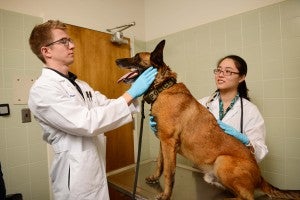“Until one has loved an animal a part of one’s soul remains unawakened”. – Anatole France
We have the privilege to observe the human-animal bond on a daily basis, within the school and throughout our programs beyond campus. The human-animal bond is defined in a number of ways, but revolves around the mutually beneficial relationship between people and animals. It has become increasingly recognized that these bonds have important health benefits essential to both. The veterinarian’s role in the human-animal bond is to maximize the potential of this unique relationship between people and animals.

A six year old Belgian Malinois service dog from the major California police agency has his fractured upper right and left canine teeth examined by Dentistry Resident Dr. Peter Strom and veterinary student Vivian Kuei of the VMTH Dentistry Service at the William R. Pritchard Veterinary Medical Teaching Hospital at the University of California Davis School of Veterinary Medicine.
Photo by Don Preisler/UCDavis
To enhance one aspect of the human-animal bond, our school has entered into a partnership with the UC Davis Police Department to establish the Faithful Partner Program, a fund to assist with the medical costs of treating canine officers, as well as search and rescue dogs that may be injured in the line of duty. Our hospital has an extensive history of caring for canine officers, having treated 65 police dogs in the past four years, and by offering free annual teeth and eye examinations for military and service dogs.
Through the creation of the fund, we will be able to treat dogs like Charlie, a new member of the UC Davis Police Department. Charlie was trained after being adopted from a rescue situation in the Davis area. He is certified in explosive detection and also locates evidence at crime scenes. We are proud to be able to establish a fund to keep these loyal companions healthy. This program is one way we can give back the love and devotion demonstrated by these working dogs, who eagerly serve to protect us from harm.
In a recent article published in the journal Science, researchers have demonstrated a mechanism that helps explain the human-canine bond and how it has evolved through domestication for the mutual benefit of both species. The authors present findings indicating that while we lock our gaze with our beloved canine companions, an oxytocin feedback loop is enhanced that deepens that relationship. Dog owners whose dogs gazed at them the most time had the largest elevations in oxytocin after interacting with their dogs; the dogs, in return, experienced a similar oxytocin increase.
We experience similar oxytocin surges when we engage with those humans we love. I am sure my new granddaughter creates these changes in me as I look at her, which is why I have her picture as my favorite computer background. These findings may also help explain how dogs benefit autism patients or people who suffer from post-traumatic stress.
So as we look deep into the eyes of our faithful companions, they may truly be opening up windows to our soul, bringing unconditional love into our lives. It is fitting that we serve them in their time of need.
